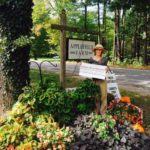Boston Area Gleaners at work.
Photo/submitted
By Marianne Delorey
The first modern grocery store, a Piggly Wiggly, opened in 1916 in Memphis, Tenn. With the ability to buy in bulk from farmers farther away, Americans were no longer restricted to local produce and the growing season. This modern supply chain has greatly expanded the quantity and variety of food available, and yet today, one in seven Americans struggles to get enough to eat. Hunger for seniors is particularly problematic, as their nutritional needs can be exacerbated by dietary restrictions due to medical conditions, their inability to obtain foods can be compromised by transportation difficulties, and their inability to afford food can be driven by expensive medications.
Enter a Waltham-based nonprofit called Boston Area Gleaners (BAG). In a nutshell, the Gleaners goes through a farmer’s fields to find produce that would otherwise not make it to market and donates the fresh fruits and vegetables to local food pantries and other organizations that serve those facing hunger.
It all begins at the farm. Ray Mong, who makes his living at Applefield Farms in Stow, Mass., explained why not all the produce grown on a farm actually makes it to market. There are obviously “seconds”—produce that is not quite as pretty and will likely not sell. But sometimes a farmer grows an entire crop, only to find that there are no buyers for his or her product. It may be simple supply and demand – for instance, all the tomatoes across the state tend to come ripe around the same time. Perhaps each of the regular stores has enough for now, and so a crop cannot be sold at a price that will compensate the farmer for the labor involved in the harvest. Sometimes, gleaning the fields is a huge time saver for the farmer because cutting back certain plants or removing fruit can entice a plant to grow more later that season.
BAG then coordinates with their volunteer gleaners to collect what is available. Ruth, one of the BAG volunteers, gleans because she enjoys getting fresh air and she gets to meet other volunteers who she would otherwise not meet. She loves the physical labor and she loves the serenity of a farm. She was named in honor of Ruth from the bible and feels called to glean because it is how her namesake supported herself after she was widowed. She has been volunteering for three years now, and she sees gleaning as a great way to stay physically active while giving back to her community. After the produce is gleaned, the staff of BAG take over. They bring the harvest to their distribution center in Waltham and let hunger-fighting organizations know what is available. Those organizations may order different items depending on what they can serve. At Colony Retirement Homes, the kitchen manager looks at the menu for the upcoming week to determine where she can use some fresh produce.
After she orders what she can use, one of the elderly residents volunteers to take a trip to the distribution center in Waltham to collect the boxes of produce. This volunteer does have a bit of trouble getting around, but he can still drive and he enjoys getting out of his apartment. More importantly, he likes the feeling of being useful to the community and doing something productive with his time. The BAG staff load his car and the kitchen staff unload it for him when he returns.
The Colony kitchen, just like each of us individually, has grown used to the experience of the larger grocery stores. Since they have been receiving produce from BAG, however, the cooks have become more creative and more excited about cooking. They have fresher ingredients with which to cook. Yes, sometimes everyone is overwhelmed by zucchini bread, zucchini boats, and zucchini pancakes, but finding new and different ways to cook something can be a great challenge for a creative soul. Finally, the farm grown produce reaches the elderly residents. These low-income elders rely on Colony’s meals program to stay healthy and independent in the community and they love the fresh veggies. They report that the flavors are fuller, the colors are more vibrant, and perhaps, it reminds them of their childhood to receive the bounty of the harvest.
The farmer, Ray, noted “I grow things, it is what I do.” But he also made the point that he is a farmer because he wants to nourish people. From farm to table, the entire BAG process is nourishing people with produce, but they are also nourishing their souls with the opportunity to give back to the community and be connected to the earth.
Boston Area Gleaners only started operating 12 years ago and yet they have accomplished much. Perhaps the best side effect of working with BAG is moving away from grocery stores.
Although you can’t beat the convenience, there is something so much more natural about working directly with the farms. An earthiness and a connection, that lasts our whole lives.
Marianne Delorey, Ph.D. is the executive director of Colony Retirement Homes. She can be reached at 508-755-0444 or mdelorey@colonyretirement.com and www.colonyretirementhomes.com. Archives of articles from previous issues can be read at www.fiftyplusadvocate.com.

Photo/submitted












